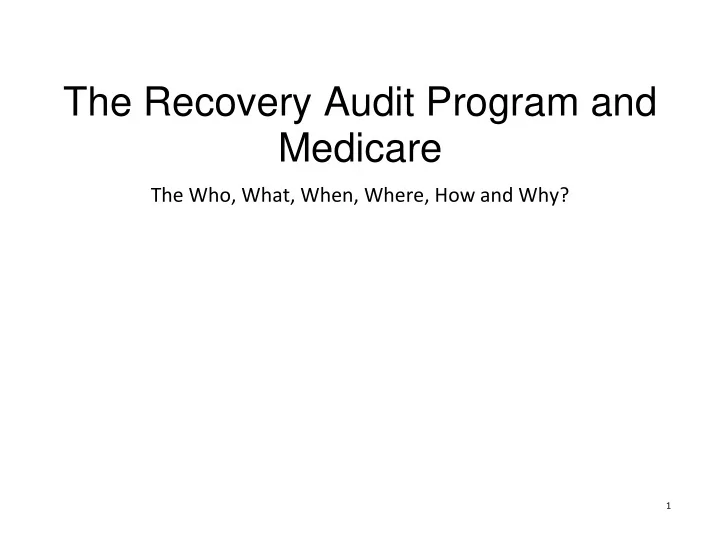

The Recovery Audit Program and Medicare The Who, What, When, Where, How and Why? 1
Agenda What Is A Recovery Auditor? Will The Recovery Auditors Affect Me? Why Recovery Auditors? What Does A Recovery Auditor Do? What Are The Providers’ Options? What Can Providers Do To Get Ready? 2
What Is A Recovery Auditor ? The Recovery Auditors Program Mission The Recovery Auditor detect and correct past improper payments so that CMS can implement actions that will prevent future improper payments: o Providers can avoid submitting claims that do not comply with Medicare rules o CMS can lower its error rate o Taxpayers and future Medicare beneficiaries are protected. 3
Will The Recovery Auditors Affect Me? Yes, if you bill fee-for-service programs, your claims will be subject to review by the Recovery Auditors. 4
Why Recovery Auditors? Recovery Audit Legislation: Medicare Modernization Act, Section 306 Required the three year Recovery Audit demonstration Tax Relief and Healthcare Act of 2006, Section 302 Requires a permanent and nationwide Recovery Audit program by no later than 2010 Both Statutes gave the CMS the authority to pay the Recovery Audits on a contingency fee basis. 5
What Does A Recovery Auditor Do? The Recovery Audit Review Process: Recovery Auditors review claims on a post-payment basis Recovery Auditors use the same Medicare policies as Carriers, FIs and MACs: NCDs, LCDs and the CMS Manuals Three types of review: o Automated (no medical record needed) o Semi-Automated (claims review using data and potential human review of a medical record or other documentation) o Complex (medical record required) Recovery Audits look back three years from the date the claim was paid Recovery Auditors are required to employ a staff consisting of nurses, therapists, certified coders and a physician CMD 6
The Collection Process Same as for Carrier, FI and MAC identified overpayments Carriers, FIs and MACs issue Remittance Advice o Remark Code N432: Adjustment Based on Recovery Audit Carrier/FI/MAC recoups by offset unless provider has submitted a check or a valid appeal. 7
What Is Different? Recovery Auditors will offer an opportunity for the provider to discuss the improper payment determination with the Recovery Auditors (this is outside the normal appeal process) Issues reviewed by the Recovery Auditor will be approved by the CMS prior to widespread review Approved issues will be posted to a Recovery Audits Website before widespread review 8
What Are The Providers’ Options? If you agree with the Recovery Auditor determination: Pay by check Allow recoupment from future payments Request or apply for extended payment plan Appeal Appeal Timeframes http://www.cms.hhs.gov/OrgMedFFSAppeals/Downloads/Appealspr ocessflowchartAB.pdf 935 MLN Matters http://www.cms.hhs.gov/MLNMatterArticles/downloads/MM6183.pdf 9
Three Keys to Success Minimize Provider Burden Ensure Accuracy Maximize Transparency 10
Minimize Provider Burden Limit the Recovery Auditors “look back period” to three years Recovery Auditors will accept imaged medical records on CD/DVD Limit the number of medical record requests — ADR Limits: http://www.cms.gov/Research-Statistics-Data-and- Systems/Monitoring-Programs/Recovery-Audit-Program/Provider- Resource.html 11
Ensure Accuracy Each Recovery Audit team employs: Certified coders Nurses Therapists A physician CMD The CMS’ New Issue Review Board provides greater oversight Recovery Audit Validation Contractor provides annual accuracy scores for each Recovery Audit organization If a Recovery Auditor loses at any level of appeal, the Recovery Auditor must return its contingency fee 12
Maximize Transparency New issues are posted to the Web Vulnerabilities are posted to the Web Recovery Audit claim status Website Detailed Review Results Letter following all Complex Reviews 13
What Can Providers Do? 1. Know Where Previous Improper Payments Have Been Found: Look to see what improper payments were found by the Recovery Auditors: o Demonstration findings: www.cms.hhs.gov/rac Look to see what improper payments have been found in OIG and CERT reports: OIG reports: www.oig.hhs.gov/reports.html CERT reports: www.cms.hhs.gov/cert 14
What Can Providers Do? 2. Know If You Are Submitting Claims With Improper Payments: Conduct an internal assessment to identify if you are in compliance with Medicare rules Identify corrective actions to promote compliance Appeal when necessary Learn from past experiences 15
Prepare To Respond To Recovery Auditors Medical Record Requests Tell your Recovery Auditor the precise address and contact person they should use when sending Medical Record Request Letters: o Call Recovery Auditor o Use Recovery Audit Programs’ Websites When necessary, check on the status of your medical record (Did the Recovery Auditor receive it?): o Call Recovery Auditor o use Recovery Audit Programs’ Websites 16
Appeal When Necessary The appeal process for Recovery Audit denials is the same as the appeal process for Carrier/FI/MAC denials Do not confuse the “Recovery Audit Programs’ Discussion Period” with the Appeals process If you disagree with the Recovery Auditor’s determination: o Do not stop with sending a discussion letter o File an appeal before the 120 th day after the Demand letter. 17
Learn From Past Experiences Keep track of denied claims Look for patterns Determine what corrective actions you need to take to avoid improper payments. 18
Contact Information Recovery Audit Programs’ Website: www.cms.hhs.gov/RAC Recovery Audit Programs’ E-mail: RAC@cms.hhs.gov 19
Recommend
More recommend